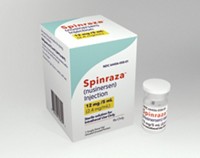Advertisement
Grab your lab coat. Let's get started
Welcome!
Welcome!
Create an account below to get 6 C&EN articles per month, receive newsletters and more - all free.
It seems this is your first time logging in online. Please enter the following information to continue.
As an ACS member you automatically get access to this site. All we need is few more details to create your reading experience.
Not you? Sign in with a different account.
Not you? Sign in with a different account.
ERROR 1
ERROR 1
ERROR 2
ERROR 2
ERROR 2
ERROR 2
ERROR 2
Password and Confirm password must match.
If you have an ACS member number, please enter it here so we can link this account to your membership. (optional)
ERROR 2
ACS values your privacy. By submitting your information, you are gaining access to C&EN and subscribing to our weekly newsletter. We use the information you provide to make your reading experience better, and we will never sell your data to third party members.
Pharmaceuticals
Isis, Genzyme In Heart Drug Deal
Cholesterol treatment further validates antisense approach to targeting RNA
by Lisa M. Jarvis
January 14, 2008
| A version of this story appeared in
Volume 86, Issue 2

In a major boost for antisense technology, Isis Pharmaceuticals and Genzyme have sealed a deal that could be worth nearly $2 billion for mipomersen, Isis' second-generation antisense drug. Antisense drugs target the RNA that controls the production of disease-causing proteins.
To gain access to the drug, which lowers cholesterol, Genzyme will shell out $175 million upfront and, upon closing of the deal, buy $150 million worth of Isis stock. Isis stands to receive another $825 million in development and regulatory milestones, as well as up to $750 million in commercial milestones.
Isis also retains a healthy level of any profits from sales of mipomersen, which the company's CEO, Stanley T. Crooke, calls its "most important asset."
Mipomersen, currently in Phase III trials in patients with familial hypercholesterolemia, is widely viewed as a potential blockbuster. Earlier trials showed it to be effective in lowering lipid levels both on its own and in combination with other drugs, and it can be given to patients who cannot tolerate statins. It also enjoys the benign side-effect profile associated with the antisense approach.
Mark Monane, a stock analyst with Needham & Co., calls the midsized Genzyme a "near optimal partner" for developing the cholesterol drug. He points to Genzyme's experience in bringing niche drugs to market, particularly in the cardiovascular category. For Isis, the most critical factor was that mipomersen "will be almost as important to Genzyme as it is to us," Crooke tells C&EN.
Drugs from the first generation of antisense technology were based on single-stranded DNA-like oligonucleotides and did not survive in the body long enough to have an impact on disease. As a result, some colossal failures in late-stage trials caused many observers to doubt the validity of the technology.
Second-generation drugs, single-stranded oligos whose backbone chemistry makes them look like both DNA and RNA, have proven more potent. Whether or not the technology is sound is "a question it's time for people to stop asking," Crooke says. Between the deal with Genzyme and earlier Isis alliances with Bristol-Myers Squibb and Johnson & Johnson, he adds, it is clear that "smart people who are looking at the data see that second-generation antisense drugs are working."




Join the conversation
Contact the reporter
Submit a Letter to the Editor for publication
Engage with us on Twitter